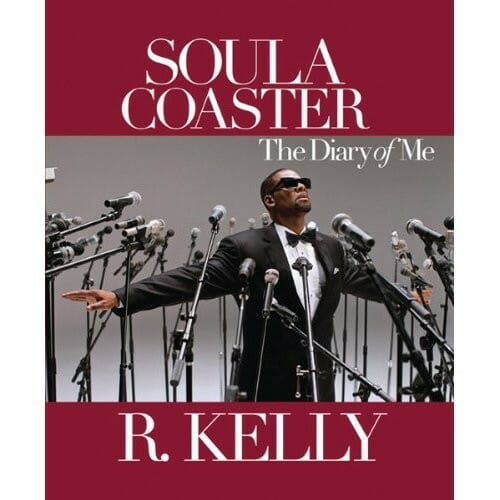Soulacoaster: The Diary Of Me by R. Kelly
He’s A Flirt

There’s a scene early in Soulacoaster: The Diary Of Me, R. Kelly’s amusingly named memoir, which seems to anticipate the singer’s future. At a certain point in church, young Kelly “got a little bored with the songs.” So, he writes, “I’d change the words around. When everyone was singing, ‘Jesus is on the main line, tell him what you want,’ I sang, ‘That girl in the choir is so fine, gonna tell her what I want.’”
Kelly’s aunt heard him, slapped him “upside the head,” and warned that if she heard him mixing the heavenly with the carnal again she’d tell his mom.
R. Kelly’s musical career has often oscillated between—and combined—the intensely religious and the intensely erotic. It’s a classic combination for a soul singer, but for Kelly this duality serves only as a jumping-off point.
We don’t usually expect idiosyncratic moves from successful pop stars. The pressures of selling albums and trying to appeal to the median listener often produce a certain middle-of-the-road orthodoxy. One of the standard narratives of pop concerns the small-scale artist able to take risks, turn his or her back on market forces, and create “art.” Meanwhile, the men and women on the big labels struggle to produce disposable pleasures to satisfy the fickle taste of the public.
But R. Kelly has sold many millions of albums despite, or perhaps because of, his willingness to be both strange and unpredictable (some might say unsavory). Kelly’s solo debut, 12 Play—an extension of, and pun on, foreplay—came out in 1993. Songs like “Bump N’ Grind” charted well and established Kelly as a raunchy R&B hit-maker.
After grabbing attention with a lascivious audacity guaranteed to excite and scare Americans in equal measure, Kelly moved in new directions. He worked to perfect his brand of lush soul and smart disco. Songs like “When A Woman’s Fed Up” and “Step In The Name Of Love” combine a symmetrical or descending figure played on guitar or keyboard, bursts of bass and ticking percussion—Kelly’s groovy bread and butter. He refers to it in Soulacoasta as “new flavored old school R&B.”
Kelly also built a bridge to the world of hip hop, recognizing the genre as a commercial juggernaut. In his words, “I understood that rap was an art form. The challenge became clear: How can rap and R&B come together?”
Kelly’s 1995 R. album contained a memorable collaboration with Notorious B.I.G; since then he’s collaborated with a number of rappers (his book lists more than 50). Kelly also employs a sort of sing-speak style at times, and on the 2000 album TP-2.com, he explicitly adopted some of the language of hip hop, calling himself an “R&B thug.”
Early in his career he embraced the remix, incorporating rap’s willingness to mess around with the building blocks of a song. Remixes account for several of Kelly’s most popular and exciting tracks, including “Ignition” (a petition floats around the Internet to make it America’s new national anthem) and “I’m A Flirt.”
Bumping and grinding, creating “new flavored old school R&B,” merging R&B and hip hop—it would be a lot for one man. Kelly also recorded an entire gospel album. His spiritual side led to one of the biggest hits of his career, “I Believe I Can Fly.” He’s written songs for Muhammad Ali, President Obama and the 2010 World Cup. Some people look to Kelly for arousal, some for inspiration and reassurance, some for both.
-

-

-

-

-

-

-

-

-

-

-

-

-

-

-

-

-

-

-

-

-

-

-

-

-

-

-

-

-

-

-

-

-

-

-

-

-

-

-

-








































